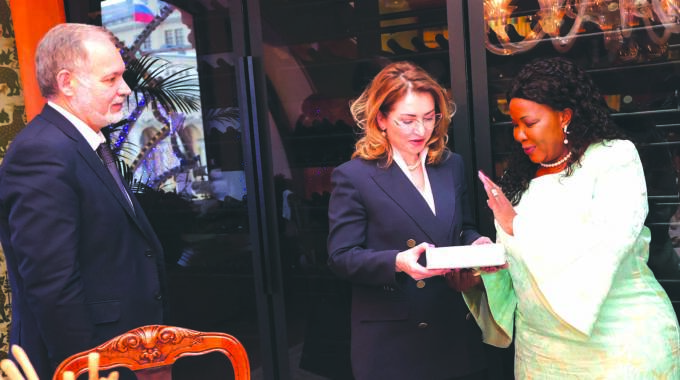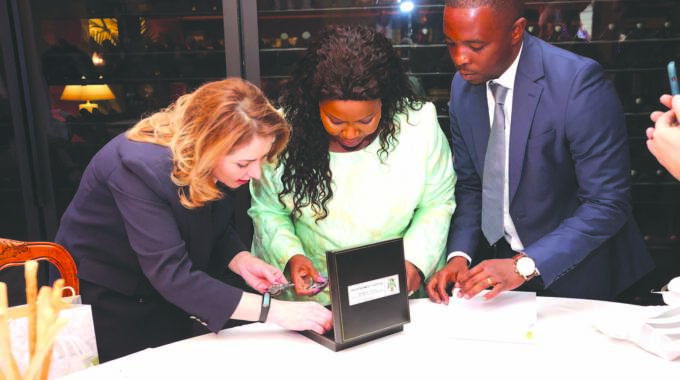
The Sunday Mail

Tendai Rupapa in MOSCOW, Russia
FIRST Lady Dr Auxillia Mnangagwa yesterday met the Russian Federation’s Deputy Minister of Science and Higher Education, Mrs Natalya Bocharova, and Deputy Director of International Cooperation in the same ministry, Mr Sergey Terashkevich, for in-depth discussions on wide-ranging issues of mutual interest, where her host invited Zimbabwean learners for a special geological expedition in Russia.

First Lady Dr Auxillia Mnangagwa hands over a gift to Russian Federation Deputy Minister of Science and Higher Education, Ms Natalya Bocharova while the Deputy Director International Cooperation in the same ministry Mr Sergey Kravtsov look on after their meeting in Moscow, Russia yesterday.
So wide-ranging were the issues discussed that they touched on agriculture, education, manufacturing, mining and technology, among many others.
Dr Mnangagwa was accompanied by Mrs Rebecca Kaviya, the director of legal services in the Ministry of Higher and Tertiary Education, Innovation, Science and Technology Development.
Among projects discussed is the one in the science and technology sector, which came as a result of the cooperation between Zimbabwe National Geospatial and Space Agency (ZINGSA) and ROSCOSMOS on the peaceful use of space.
This gave birth to the signing of the Joint Research Implementation Agreement between ZINGSA and South West University for the development of ZimSat-2, which the Russians proposed to name Dr Auxillia Mnangagwa SAT in special recognition of the philanthropic work that Amai Mnangagwa is carrying out in Zimbabwe, which has improved the life of vulnerable groups.
Implementation of this project in Zimbabwe will enable the country to meet the challenges of socio-economic development using advanced space services.
“Our geological university came up with the idea of creating a centre of geological resources. It also came up with another idea of creating a special time frame for schoolchildren, so we are now ready to welcome the students from Zimbabwe who will take part in a special geological expedition, which will take place in the south of Russia,” Mrs Bocharova said.
“This is done in order to allow the students to go through some special orientation project and become the students of this university specialising in geology.”
Mr Terashkevich added: “The students will be able to take part in the research in geology. We will be very happy if your Angel of Hope Foundation would also take part in this project by giving us students who are under the foundation. The event will coincide with the Russia-Africa Summit next year.”
The Russia-Africa Summit is a meeting for universities under the Russia-Africa Network.

Environment and Tourism patron First Lady Dr Auxillia Mnangagwa hands over a gift depicting the tourist sites, natural wonders and wildlife abundant in Zimbabwe to the Russian Federation Deputy Minister of Science and Higher Education, Ms Natalya Bocharova in Moscow, Russia yesterday. Pictures: John Manzongo
The network of universities is meant to foster inter-university collaborations and promote education, scientific and technical cooperation, as well as projects that are mutually beneficial to the two countries.
Under this network of universities, Zimbabwe State universities signed agreements under the Russia-Africa Network of Universities.
Mr Terashkevich told Dr Mnangagwa that he would become the Zimbabwe-Russia ambassador in the said expedition.
The Russian Minister asked the First Lady if she had other ideas that Zimbabwe and her country could develop together.
“Thank you very much for this visit to Russia. I see you have a lot for Zimbabwe. Russia has been with us for a long time, since time immemorial, and you have stood by us in all the difficult times that we have come through,” she said.
Dr Mnangagwa told her hosts that Zimbabwe’s economy was agro-based.
“In Zimbabwe, we mainly survive on agriculture. We also have important sectors that include health, tourism, mining, education and energy. We want to see this grow from strength to strength. All the memoranda of understanding (MOUs) signed between Zimbabwe and Russia, it is my wish to see them come to fruition,” she said.
The First Lady highlighted the various initiatives she was undertaking to promote the empowerment of women through agriculture in Zimbabwe.
She spelt out the need for equipment to speed up processes and attain higher yields.
“We are also into cotton farming, where I am the patron for women in cotton production, but because of the erratic rainfall, we are not getting as much as we expect. So, your coming in with this technology and training to enhance the growing of cotton will help our economy; it will also make sure that our families are in the field and benefit from what is going to come out of the farming of cotton and tobacco.
“I am also the patron for Agriculture4She. When you talk about farming, then it comes to me directly because I am working with all women countrywide, encouraging women to fully participate in farming activities.
“They embraced this initiative and we are ready to harvest high yields,” she said.
Mr Terashkevich highlighted the project proposal for the scientific and technical support of the crops production sector and natural fibre processing.
The project will be implemented through the Harare Institute of Technology, Chinhoyi University of Technology and Kosygin State Textile University.
He said this will mainly focus on education on cotton crop cultivation, irrigation and primary processing of the cotton.
A hands-on person, the First Lady said her office was willing to coordinate most activities working with women to ensure success.
“I would like to thank universities from Russia and through the government of Russia that I have received scholarships for underprivileged children. First of all, I received 12 scholarships, which came under the Angel of Hope Foundation, and now, in addition, I have 14 more scholarships, making them 26 under my foundation.
“For these scholarships, I look at the students – those disadvantaged students who are academically gifted.
‘‘So, I scout for these students in all the country’s provinces. I am pleased by the tremendous progress between your ministry and our ministry in Zimbabwe, where you met Professor Murwira (Zimbabwe’s Higher and Tertiary Education, Science, Innovation and Technology Development Minister) and you came up with so many ideas and exchange programmes that we want to see our countries working together on,” she said.
Zimbabwe, Dr Mnangagwa said, needed assistance to get back into manufacturing at a time when some companies were closing down due to the effects of sanctions.
“It is very essential for our country to be back on track in terms of manufacturing. Because of the sanctions, we see that some of the companies are closed, and if we can resuscitate those companies, our economy will grow and the lives of people will be improved,” she said.
The most important thing Zimbabwe needed, the First Lady said, is technology.
“We want technology to be imparted to our country so that we are also modernised and be able to use advanced technology. I want to share with you the MOUs that we signed already. There is a MOU in cooperation in higher education and science, we have another MOU on cooperation in the field of scientific, technical and innovation activities, another one on recognition of higher education qualifications, a MOU on training and skills development, on nuclear energy, 11 agreements under the Russia-Africa Network of Universities, an MOU between ZINGSA and ROSCOSMOS on the peaceful use of space. Those are the MOUs that we signed between Russia and Zimbabwe through the Ministry of Higher and Tertiary Education,” she said.
A MOU between ZINGSA and Russian State Hydro Meteorological University on capacity building and technology transfer, joint research implementation agreement between ZINGSA and South Western University on Space Science and Technology, and an agreement between the University of Zimbabwe and Rosbiotech University on the setting up of a joint international centre for food security and food systems were also highlighted.
The deputy director, Mr Terashkevich, who showed in-depth knowledge of Zimbabwe, assured the First Lady that they would work closely with the First Lady’s Office and Minister Murwira to ensure the projects were fully implemented.
“Since you are extremely interested in these kinds of projects, we will arrange a conference which will enable our specialists to come to Zimbabwe and organise this work directly under your territory. Our possibilities are only restricted by our desires,” the deputy director said.
Said Dr Mnangagwa: “Russia’s leadership position in the development of space sciences and technologies is very important and it also helps us to explore deeper the application of space for peaceful development initiatives, and we are looking forward to the ZimCom-1 and ZimSat-2, which you are proposing to name after me, and I fully accept. Zimbabwe also recognises Russia’s advanced technologies in the area of mining technologies, an area in which Zimbabwe has comparative advantage with a full spectrum of minerals yet with less technologies. We have a lot of minerals and we are in need of advanced equipment to extract them and for value addition.”
She called for assistance with expertise and equipment.
“If Russia comes on board, it will help us a lot. We believe that through Russian State University for Geological Prospecting we can realise all this,” she added.
Dr Mnangagwa said she was interested in the Centre for Food Security because of her drive to promote farming and traditional crops that were resistant to drought.
“In addition, Zimbabwe notes Russia’s advanced capabilities in electronics, engineering and electronics manufacturing, and hence the desire to work with Russia in this area. Honourable Deputy Minister, self-sufficiency in food production is one of Zimbabwe’s most important policy priorities.
“We therefore recognise Russia’s advanced food production chain, which involves production and purchasing of agricultural produce. This partnership with Russian institutions will enhance our capabilities in Zimbabwe in these areas. In order to see these projects to fruition, we need competent human capital, which forms one of the core mandates of our two ministries.
“Zimbabwe wishes to thank you very much for support through provision of scholarships. We look forward to the strengthening of the scholarship programme through focused scholarships that address the critical skills gap in the above.
“I am informed that we have already set up a centre for language studies at the University of Zimbabwe, and more will be set up in other universities, and I also want to be one of the students. In addition, we have facilitated the first Russian language exam at the Management Training Bureau.”
The First Lady said she was charmed by the prospect of availing student internships in Russian companies to ensure they get the necessary hands-on training.
“We believe that better times are yet to come as we cement our very good relationships with these transformative economic initiatives in the education, science and technology sectors,” she said.
Amai Mnangagwa expressed interest in the Women in Business programme, which the Deputy Minister indicated can be put on the Russia-Africa Agenda so that the First Ladies of African countries can participate.
The First Lady expressed interest in this project, saying it provided a platform to share ideas for the betterment of the lives of people in their countries as mothers of nations.



